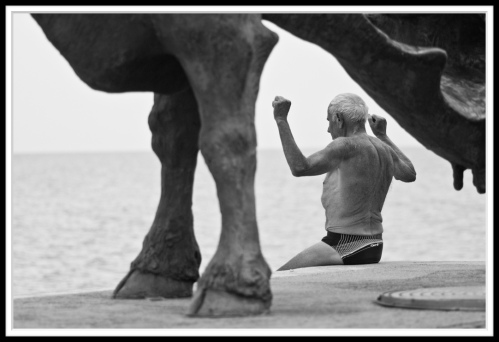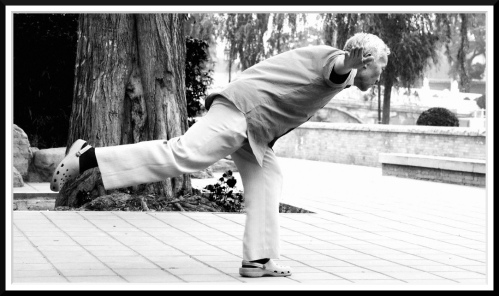 Photo by: eloja
Photo by: eloja
But first…Death By Exercise Revisited
A while back, I wrote an essay titled Avoiding Death By Exercise. You can read it here. The article was critical of the promises of long term health benefits derived from training for endurance sports like marathons. The main points from the essay: (1) endurance sports are over-hyped from a marketing standpoint; (2) the time costs outweigh the benefits achieved from training for endurance events; (3) training for and participating in endurance events puts enormous strain and stress on your body…beyond the risk of injury, there is an increased risk of sudden cardiac death.
longevity
One issue not discussed in that essay was the impact of endurance training on longevity. While perusing Anthony Colpo’s website, one of his posts referenced this article: Mortality and longevity of elite athletes. This is not a definitive study and it doesn’t claim to be. Rather, it is a meta-study and as the article points out, some of the research included for review is quite old (e.g. some of the athletes covered by the studies competed in the late 1800’s and early 1900’s). However, the article does reinforce some key practical points and it also asks good follow-on questions.
Key Points
(1) Similar to leisure time physical activity, engaging in competitive sports and vigorous exercise training is generally beneficial to improving mortality and longevity.
(2) Elite endurance athletes (e.g. distance runners and cross country skiers) tend to survive longer than people in the general population.
Overall, endurance athletes appear to maximize longevity living significantly longer than the general population. In particular, the observed deaths among endurance athletes were less than two thirds of the expected deaths estimated from the general population. This should hearten those that focus on endurance sports.
(3) Elite mixed sport athletes (e.g. soccer, basketball, ice hockey, and short to moderate term events in track and field) are also likely to live longer than the general population.
(4) Elite power athletes may survive longer, similar to, or shorter than the general population depending on type of sport and substance use.
Follow-on Questions
(1) What role does the high volume of rigorous exercise engaged in by elite athletes play in increased longevity?
(2) Do the genetic factors that predispose one to becoming an elite athlete also tend to increase longevity?
(3) Does the negative impact of performance enhancing substances mask positive results with regards to elite power athletes? (It would be interesting to compare the impact of performance enhancing substances across all three groups of elite athletes…you’d want to cross-reference with various substances…chronicle interaction effects between substances…total research nightmare)
(4) Can we get similar studies for elite women athletes?
Go Out and Play
 Photo by: Ross Hong Kong
Photo by: Ross Hong Kong
What does this mean for all of us non-elite athletes? Bottom line – Physical activity increases longevity. The authors cite a report that 40% of adults aged 18 years and older engage in no leisure time physical activity. That’s nuts. Come on people – Go out and play. If you want to live a long and healthy life, get up and move.







good post, as you noted there are too many factors the most striking being athletic types tend to exercise and maybe live longer. there is a lot in the genes. still it is always good to play!
I’d love to see further research on the drug issue across sports as well. I’d also like to see the difference in the longevity of yesterdays elite endurance athletes (who are the ones now living it up at old age) vs those on the scene over the last 20 years or so when drug use skyrocketed. The stuff those guys do to their bodies is well beyond the pale.
I’d also like to see which drugs honestly have a negative longterm effect and which don’t. I’d imagine amphetamine use would rank high among the worst offenders of bodily harm. Strength athletes are probably most associated with steroid use, but there is a long tradition of other drugs being used which are much worse and tend to revolve around their contest prep and day-of performance.
Of course, being able to research this gets harder when (at least here in the states) the morality police get involved, lol. (Congress spending as long as they did on the “Baseball scandal” blows my mind. Sure … that’s more important than the nations health care … yep.)
Nick – This is a very interesting area. You know, what if the data came back and said that certain performance enhancing drugs are correlated with increased longevity and positive health going into old age…what would the morality police say then?
You knowit’s complicated. Take this snippet about the life of Paul Erdos: In 1979, Graham bet Erdös $500 that he couldn’t stop taking amphetamines for a month. Erdös accepted the challenge, and went cold turkey for thirty days. After Graham paid up–and wrote the $500 off as a business expense–Erdös said, “You’ve showed me I’m not an addict. But I didn’t get any work done. I’d get up in the morning and stare at a blank piece of paper. I’d have no ideas, just like an ordinary person. You’ve set mathematics back a month.” He promptly resumed taking pills, and mathematics was the better for it.
http://www.nytimes.com/books/first/h/hoffman-man.html
Pingback: Your Monthly Moment of Zen #20 | The Iron Samurai